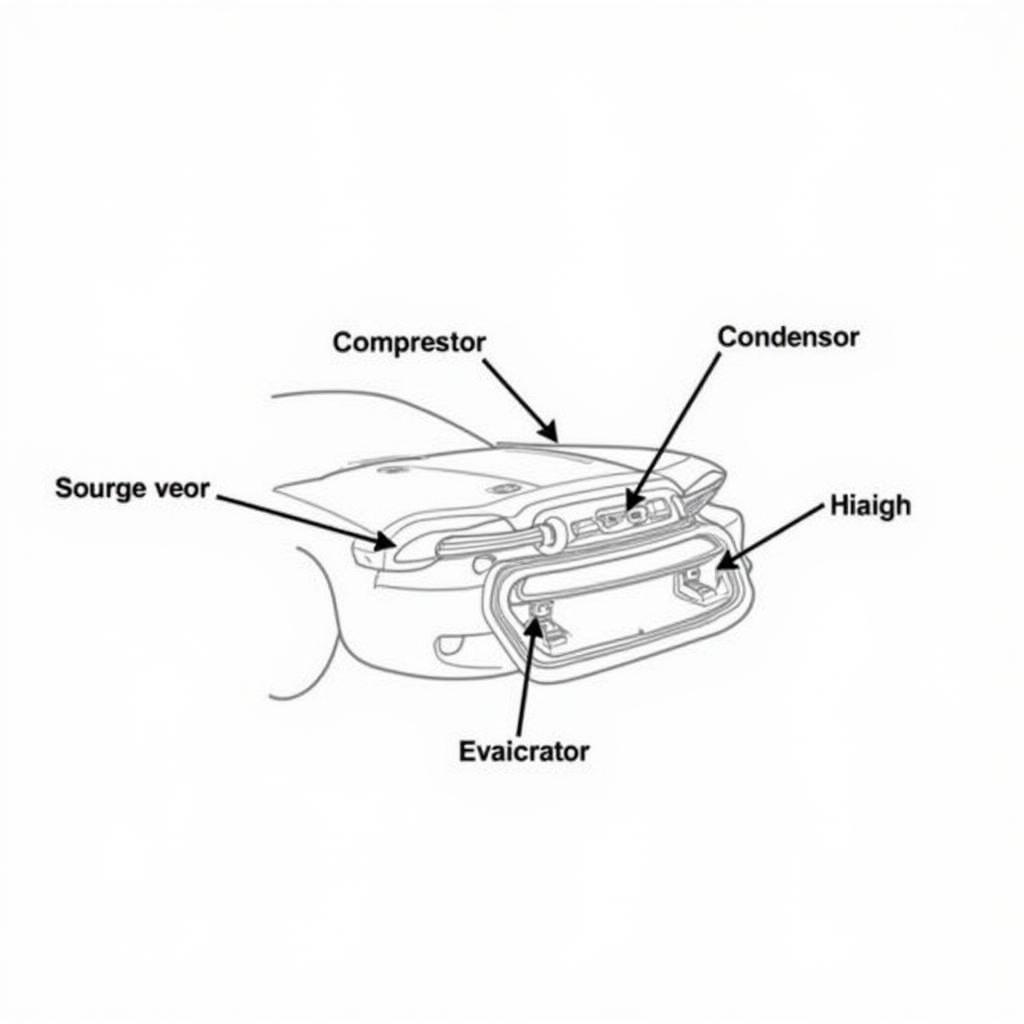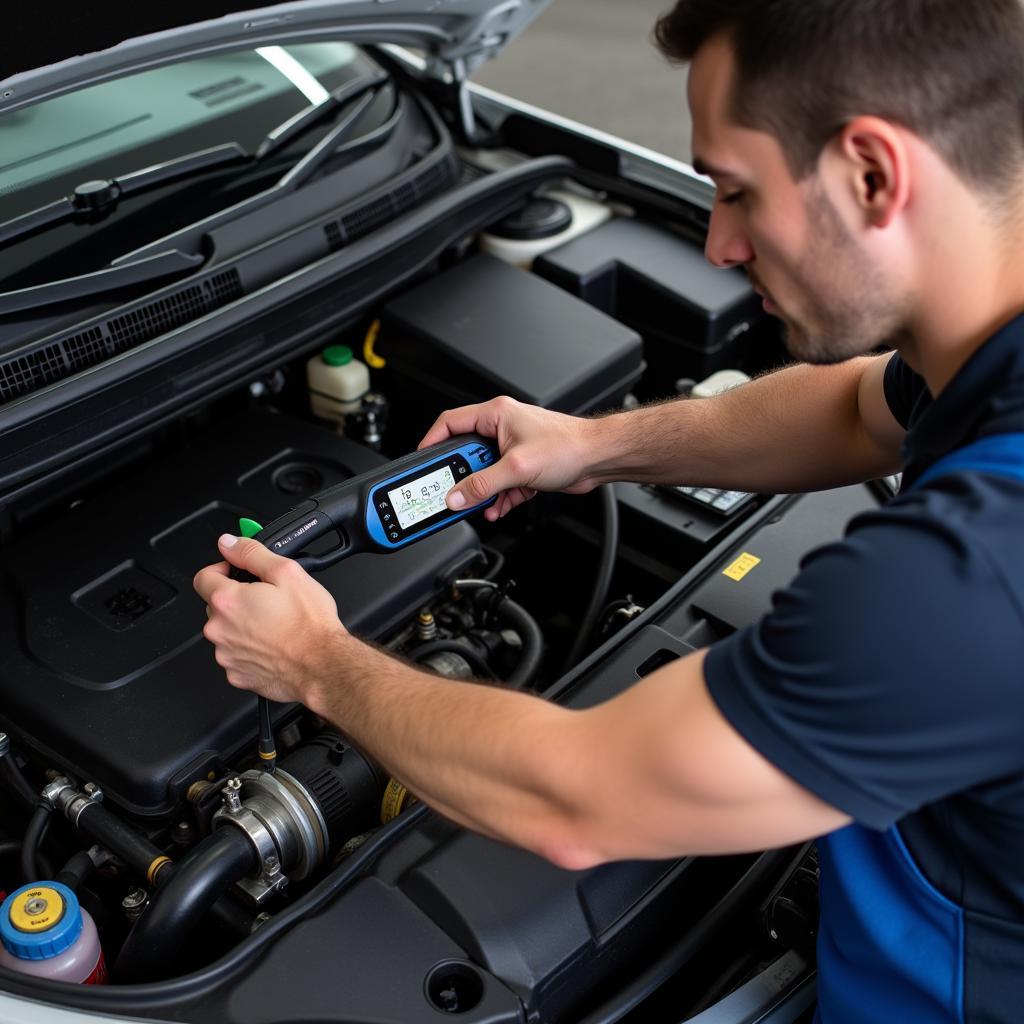Discovering your car AC is blowing hot air can quickly ruin a summer drive. A frequent culprit behind this unwelcome heatwave is an AC leak. Don’t sweat it just yet, though! Identifying and fixing a car AC leak can be straightforward. This comprehensive guide will equip you with the knowledge to cool down your car and get back to enjoying those sunny road trips.
Understanding Your Car’s AC System
Before you delve into fixing the leak, it’s helpful to grasp the basics of how your car’s AC system operates. Essentially, it functions like a refrigerator, utilizing refrigerant to absorb heat and create cool air. The system comprises several key components:
- Compressor: This component pressurizes and circulates the refrigerant throughout the system.
- Condenser: Located at the front of the vehicle, the condenser cools the refrigerant, transforming it from a high-pressure gas into a high-pressure liquid.
- Evaporator: Positioned within the passenger cabin, the evaporator receives the cold refrigerant. Air blown over it cools down, delivering that refreshing blast of AC.
- Expansion Valve/Orifice Tube: These components regulate refrigerant flow and lower its pressure before it reaches the evaporator.
- Hoses and O-rings: These connect the different parts of the system, and the O-rings create a seal to prevent leaks.
 Car AC System Components
Car AC System Components
A leak can occur in any of these areas, disrupting the refrigerant flow and rendering your AC ineffective.
Common Causes of Car AC Leaks
Understanding the usual suspects behind AC leaks can help you pinpoint the problem in your vehicle:
- Worn-out O-rings: These rubber seals naturally deteriorate over time due to heat and pressure, leading to leaks.
- Corroded hoses and connections: Exposure to road salt, moisture, and debris can cause corrosion, resulting in leaks.
- Damaged condenser: As the condenser sits at the front of the vehicle, it’s vulnerable to damage from road debris, potentially causing leaks.
- Faulty evaporator: While less common, evaporator leaks can happen due to corrosion or damage.
If you are experiencing a smelly car air conditioning, it’s essential to address this issue promptly to ensure a comfortable and healthy driving environment.
Signs of a Car AC Leak
Recognizing the telltale signs of an AC leak can help you address the problem sooner rather than later:
- Weak airflow: If your AC is blowing but the airflow seems weaker than usual, it could indicate a leak.
- Warm air blowing: This is the most obvious sign – if the air coming from your vents is warm even when the AC is on full blast, you likely have a leak.
- Hissing or bubbling sounds: These noises coming from the AC system, especially when you turn it on or off, can indicate a leak.
- Unusual odors: A strange, sweet smell coming from the vents when the AC is running can be a sign of a refrigerant leak.
- Visible oil residue: Check around the AC components under the hood for any oily residue, which might indicate a leak.
If you suspect a leak, it’s best to take your car to a trusted mechanic specializing in car air conditioning smells like urine fixing to diagnose and fix the issue.
How to Find an AC Leak in Your Car
Before you start taking things apart, it’s crucial to locate the leak:
- Visual Inspection: Carefully examine all the AC components and connections for any visible signs of damage, corrosion, or oily residue.
- UV Dye Test: This is a common and effective method where a special UV dye is added to the refrigerant. The dye will glow under a UV light, revealing the location of the leak.
- Electronic Leak Detector: These devices are highly sensitive and can detect even the smallest refrigerant leaks.
 Electronic AC Leak Detector
Electronic AC Leak Detector
It’s generally recommended to leave leak detection to professionals, especially if you’re not comfortable working with car AC systems. For expert car air conditioner fixed, consider reputable repair shops in your area.
How to Fix an AC Leak in Your Car
Once the leak is located, the repair process will depend on the severity and location of the leak:
- O-ring replacement: Worn-out O-rings are a common issue and can be easily replaced.
- Hose repair or replacement: If a hose is leaking, it might be possible to repair it with a sealant. However, replacement is usually the recommended option for a long-term solution.
- Component replacement: If the leak is in the compressor, condenser, or evaporator, these components will need to be replaced.
Unless you have experience working with car AC systems, it’s best to entrust repairs to a qualified mechanic. They have the expertise and tools to ensure the job is done correctly and safely. To find a reliable mechanic shop that fix car’s ac near you, search online or ask for recommendations from friends and family.
Preventing Future AC Leaks
Preventing AC leaks is always better than dealing with them after they occur:
- Regular AC service: Get your car’s AC system serviced annually or as recommended in your owner’s manual. This includes checking for leaks, recharging refrigerant, and replacing worn-out components.
- Visual inspections: Periodically check your AC components for signs of damage or wear.
- Promptly address minor issues: Don’t ignore warning signs like strange noises or weak airflow, as addressing these early can prevent more significant problems later.
Conclusion
A malfunctioning car AC can be a major inconvenience, especially during the warmer months. Understanding the common causes of leaks, recognizing the warning signs, and knowing how to address the issue can save you time, money, and frustration. Remember, while some DIY solutions exist for minor leaks, it’s always best to consult a professional for accurate diagnosis and repair. Keep your car’s AC running smoothly with regular maintenance and timely repairs, ensuring a comfortable driving experience year-round.
For expert advice and assistance with your car AC needs, don’t hesitate to contact AutoTipPro. Our team of experienced technicians is dedicated to providing top-notch service and ensuring your car’s AC system is in peak condition. Reach us at +1 (641) 206-8880 or visit our office at 500 N St Mary’s St, San Antonio, TX 78205, United States.
FAQ
1. How much does it cost to fix an AC leak in a car?
The cost can vary significantly depending on the leak’s severity, location, and the required repairs. Simple O-ring replacements might cost a few hundred dollars, while component replacements can range from several hundred to over a thousand dollars.
2. Can I drive my car with an AC leak?
While it’s technically possible to drive with a minor leak, it’s not recommended. Driving with a leak can lead to further damage to the AC system, potentially resulting in more costly repairs down the line.
3. How long does it take to fix an AC leak?
Minor repairs, like O-ring replacements, can be done within a few hours. More complex repairs, such as component replacements, can take a full day or longer.
4. How often should I recharge my car’s AC?
It’s best to follow the recommendations in your owner’s manual. Generally, it’s a good idea to have your AC system checked and recharged every two to three years, or sooner if you notice any issues.
5. How can I tell if my car needs more AC refrigerant?
If your AC isn’t blowing as cold as it used to, or if the air coming out of the vents is only slightly cool, it could be a sign that your system needs more refrigerant.






Leave a Reply